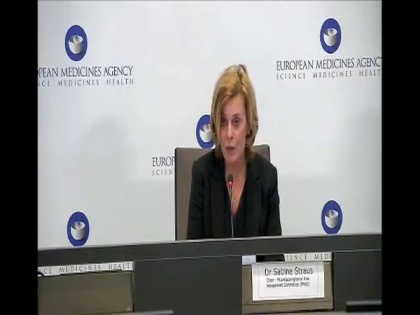AstraZeneca coronavirus vaccine is 'safe and effective': European Medicines Agency
By ANI | Published: March 18, 2021 11:09 PM2021-03-18T23:09:34+5:302021-03-18T23:20:02+5:30
The AstraZeneca coronavirus vaccine is "safe and effective" and the benefits in combating COVID-19 continue to outweigh the risk of side effects, said the European Medicines Agency's (EMA) committee, PRAC, on Thursday after concluding its preliminary review of people vaccinated with COVID-19 vaccine AstraZeneca.

AstraZeneca coronavirus vaccine is 'safe and effective': European Medicines Agency
The AstraZeneca coronavirus vaccine is "safe and effective" and the benefits in combating COVID-19 continue to outweigh the risk of side effects, said the European Medicines Agency's (EMA) committee, PRAC, on Thursday after concluding its preliminary review of people vaccinated with COVID-19 vaccine AstraZeneca.
This comes after some countries in the European Union temporarily suspended the use of the AstraZeneca COVID-19 vaccine as a precautionary measure based on reports of rare blood coagulation disorders in persons who had received the vaccine.
The European Medicines Agency said that the vaccine is not associated with an increase in the overall risk of blood clots (thromboembolic events) in those who receive it and there is no evidence of a problem related to specific batches of the vaccine or to particular manufacturing sites.
Moreover, EMA admitted that the vaccine may be associated with very rare cases of blood clots associated with thrombocytopenia, i.e. low levels of blood platelets (elements in the blood that help it to clot) with or without bleeding, including rare cases of clots in the vessels draining blood from the brain (CVST).
These are rare cases - around 20 million people in the UK and EEA had received the vaccine as of March 16 and EMA had reviewed only 7 cases of blood clots in multiple blood vessels (disseminated intravascular coagulation, DIC) and 18 cases of CVST, the agency said.
The agency further said that a causal link with the vaccine is not proven, but is possible and deserves further analysis.
The Committee was of the opinion that the vaccine's proven efficacy in preventing hospitalisation and death from COVID-19 outweighs the extremely small likelihood of developing DIC or CVST.
"However, in the light of its findings, patients should be aware of the remote possibility of such syndromes, and if symptoms suggestive of clotting problems occur patients should seek immediate medical attention and inform healthcare professionals of their recent vaccination," EMA said.
( With inputs from ANI )
Disclaimer: This post has been auto-published from an agency feed without any modifications to the text and has not been reviewed by an editor
Open in app